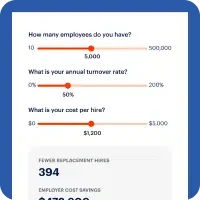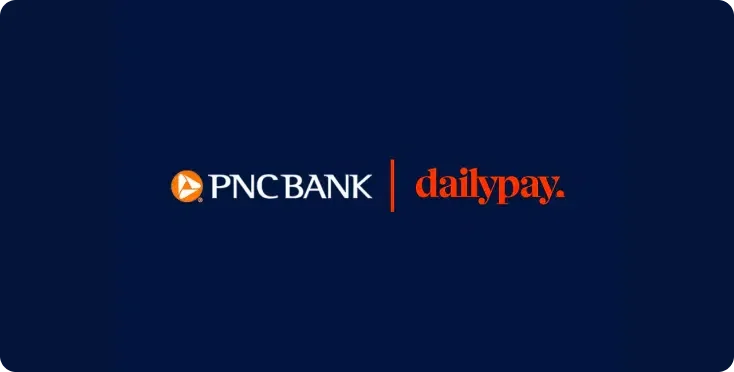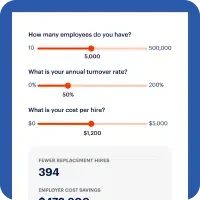Financial wellness programs in the workplace have gained popularity over the past few years as employers have started to realize the benefit of supporting employees on their journey to greater financial wellness.
According to a survey conducted by Thriving Wallet and reported by CNBC, 90% of Americans are stressed out over finances.1 According to a 2022 PwC Employee Financial Wellness Survey, financially-stressed employees are twice as likely to look elsewhere for a new job, and 76% of respondents in the same survey said that financial stress has a negative impact on their productivity.2
Further research published by the NIH shows that employees who experience high levels of stress also exhibit high levels of absenteeism and low levels of innovation.3 Because of this, it is expected that large companies will lead the way in implementing financial wellness programs.
Data reported by financial publisher Pensions & Investments supports this mentality. In 2021, more than 1 in 4 employers (27%) offered a comprehensive financial wellness program beyond a standard 401(k) program. About 5% of employers added a financial wellness program in 2021, and an additional 4.4% planned to add one in 2022.4
The philosophy is that if employees face fewer financial worries and distractions, then employers will benefit from a focused, engaged and productive workforce.
What Does an Employer Get From Offering a Financial Wellness Program?
Offering an employee financial wellness program is a helpful way to assist your employees in learning how to control their finances. According to the 2022 Bank of America Workplace Benefits Report, many employers say that financial wellness tools increase retention and attract higher quality employees while raising employee satisfaction.5 When implemented correctly, it’s possible for financial wellness programs to better a workplace.
The aforementioned Bank of America report shows that plan sponsors believe utilizing financial wellness programs makes good business sense. Employers who offer financial wellness programs are seeing noticeable improvements in productivity (50%), employee stress (43%), employee morale (41%) and employee creativity and innovation (36%).6
Unfortunately, the number of participants in workplace financial wellness programs may not be high enough to impact the overall satisfaction and engagement of an organization.
Why Isn’t Your Financial Wellness Program Working?
Wellness programs can’t help your employees if they don’t know they are available. In Bank of America’s survey, about one-third of employees said they want access to financial advice through a digital portal, and 52% of employees surveyed prefer to use a digital app to manage their finances, but 18% of employers still don’t use digital channels to communicate financial wellness benefits to employees.7 Participation rates are often low, too.
Another detriment to wellness programs is the specific content offered. They can’t be one-size fits all.
Here are some topics related to financial wellness that employees may find useful:
- Budgeting: Creating and sticking to a budget is an essential part of achieving financial wellness. You can offer advice on how to set up a budget, track expenses, and save for future expenses.
- Debt management: Many people struggle with debt, whether it’s credit card debt, student loans, or other types of debt. You can provide tips on how to pay off debt faster, negotiate with creditors, and avoid debt in the future.
- Saving and investing: Building wealth through saving and investing is a critical component of financial wellness. You can provide information on different savings and investment options, such as 401(k)s, IRAs, stocks, and bonds.
- Retirement planning: Planning for retirement is crucial for long-term financial wellness. You can offer advice on how to save for retirement, estimate retirement expenses, and choose the right retirement plan.
- Financial goal-setting: Setting financial goals is an effective way to stay motivated and focused on achieving financial wellness. You can provide guidance on how to set realistic goals, create a plan to achieve them, and track progress.
- Money mindset: The way we think about money can have a significant impact on our financial wellness. You can offer tips on how to cultivate a positive money mindset, overcome limiting beliefs, and develop healthy financial habits.
- Insurance: Protecting yourself and your assets through insurance is an important part of financial wellness. You can provide information on different types of insurance, such as health insurance, life insurance, and homeowners’ insurance, and help people choose the right coverage for their needs.
- Taxes: Understanding how taxes work is essential for financial wellness. You can provide information on how to file taxes, reduce tax liability, and take advantage of tax deductions and credits.
- Estate planning: Planning for the transfer of wealth after death is critical for financial wellness. You can provide advice on how to create a will, set up trusts, and minimize estate taxes.
- Financial literacy: Basic financial literacy is essential for achieving financial wellness. You can provide education on topics such as personal finance, banking, credit scores, and investing, helping people build a strong foundation for financial success.
Employers may not like to admit that their employees could be living paycheck to paycheck.
Some topics mentioned above like budgeting, saving for a home or thinking about investments – popular topics in wellness programs – may not be the discussion your employees are ready to have if they live paycheck to paycheck.
A poll by Gallup showed that in 2022, 40% of Americans surveyed worried about having enough money to pay normal monthly bills. Further, 52% worried about maintaining the standard of living they enjoy. Finally, 22% worried about not being able to make the minimum payment on their credit card.8
Each of these missed payments would mean incurring late fees and perpetuating financial woes. If these worries are due to low wages, versus money mismanagement, there might be more fitting topics for financial wellness programs.
What Is Another Wellness Benefit Employers Can Offer That Really Resonates With Employees?
DailyPay is one solution. Your employees can access their earned but unpaid income as often as they would like through DailyPay’s app. DailyPay does not disrupt your existing payroll process and we provide all of the funding and technology.
This financial wellness benefit allows your employees to get money in advance, so they can pay bills on time, avoid late fees, and meet financial goals. DailyPay could be the accompaniment to your wellness program that resonates with your employees the most.
All information herein is for educational purposes only and should not be relied upon for any other use. The information herein does not constitute the rendering of financial advice or other professional advice by DailyPay. No fiduciary obligation or duty exists, or is created, between you and DailyPay. DailyPay does not warrant the completeness or accuracy of any information provided to you.
1 CNBC, 2023:DailyPay, 2020
2 PwC Employee Financial Wellness Survey, 2022:DailyPay, 2020
3 Questis, 2022:DailyPay, 2020
4 Pensions & Investments, 2023:DailyPay, 2020
5 Bank of America Workplace Benefits Report, 2022:DailyPay, 2020
6 Bank of America Workplace Benefits Report, 2022:DailyPay, 2020
7 Bank of America Workplace Benefits Report, 2022:DailyPay, 2020
8 Gallup, 2022:DailyPay, 2020













